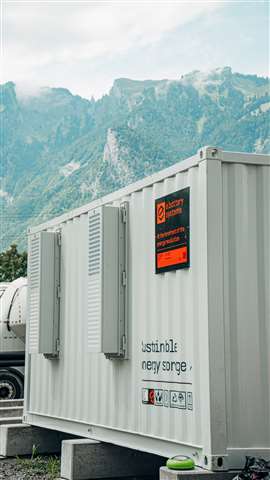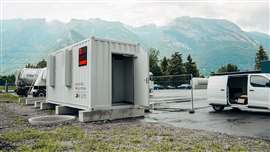e.battery systems develops second-life ESS
10 October 2023
New energy storage systems utilize used lithium-ion batteries from electric and hybrid vehicles
Following a roughly 18-month development and pilot phase, e.battery systems AG, a technology company based in Wolfurt, Austria, is launching sustainable energy storage systems (ESS) for industry and commerce which utilize used lithium-ion batteries from electric and hybrid vehicles of known manufacturers.
 ESS enable autonomous operation using power generated from clean production means, such as photovoltaics and wind or hydro power. (Photo: e.battery systems)
ESS enable autonomous operation using power generated from clean production means, such as photovoltaics and wind or hydro power. (Photo: e.battery systems)
Through automated self-consumption optimization and peak shaving, the ESS can extend the life of batteries by around 10 years and reduce costs by 30% and material consumption by 70% in comparison with new systems, e.battery systems estimated. The capacity of the storage systems ranges from 260 kW hours to several megawatt hours. Intelligent charging and discharging management ensures optimal efficiency, the company said.
The ESS is based on a 67.5-kW inverter. Additional power can be added by expanding the system with additional modules and containers. The battery modules maintain safe voltage below 60 volts. Switching between charging and discharging the batteries for peak load disconnection is fast and fully automated via the integrated control system.
Grid support
The storage solution uses 19-in. server cabinets that can be scaled for inside and outside spaces. For outside applications, IP-certified server cabinets are used, or standard server cabinets are installed in 10-, 20- and 40-ft. containers. The modular solution allows the storage systems to reach capacities of 800 kWh (10 ft.), 2 MWh (20 ft.) and 4.7 MWh (40 ft.). In addition to self-consumption optimization, the systems implement peak shaving and support the charging infrastructure.
“Often, the power grid cannot provide the power required for the public charging infrastructure. Storage systems like ours can help with this,” said Nikolai Abel, project manager, e.battery systems. “Each system supplies a power of 67.5 kW and can be expanded on a modular basis.”
The storage systems also offer protection against power outages and blackouts. In combination with other systems, they are suitable for 50-Hz grid frequency stabilization and overload management.
Cold storage
The first modular ESS were installed in July 2023. e.battery systems aims to produce a total capacity of 15 MWh in 2023. One GWh per year is planned for the future.
The 20-ft. container module solution at Bischof Lagerhaus AG, a subsidiary of food logistics company Bischof Lebensmittellogistik, stores around 1.6 MWh of energy.
 An ESS stores around 1.6 MWh of power generated by the PV facility at Bischof Lebensmittellogistik in Sennwald (Switzerland). (Photo: e.battery systems)
An ESS stores around 1.6 MWh of power generated by the PV facility at Bischof Lebensmittellogistik in Sennwald (Switzerland). (Photo: e.battery systems)
Bischof Lagerhaus operates a fully automatic multi-temperature center for the refrigeration of foodstuffs in Sennwald, Switzerland. Its 10,000 freezer pallet bays, 1,000 multi-temperature bays and 15,000 dry pallet bays are designed to ensure the ideal temperature for stored goods.
Since 2020, a photovoltaics system measuring more than 4,000 sq. meters on the roof of the building has ensured a sustainable source of refrigeration power. Following expansion in October 2023, more than 1,800 kWp of potential power will be available from a system measuring more than 9,000 sq. meters. The combination of this facility with e.battery systems’ ESS will now enable the optimization of self-consumption.
“Every kilowatt counts. We cover most of our demand from solar power, and we’re reducing our CO2 consumption, securing our cold chain and even benefiting financially in the long term,” said Christoph Schruf at Bischof Lagerhaus.
Sustainable solution
The scalable solutions from e.battery systems can also be used to complement wind and hydro power. “Sustainable products are the basis for tomorrow’s circular energy economy. With our modular systems, we offer optimized solutions for a wide range of industrial applications,” said Christopher Schöpf, founder and CEO of e.battery systems.
For example, a small hydro power plant in Schlins, Vorarlberg, supplies the adjacent industrial park with power. Since July, a custom ESS with a capacity of around 260 kWh has been used to reduce peak loads. The intelligent solution is activated automatically when energy peaks occur and covers the increased power requirement from the battery storage system.
“This combined solution reduces our energy costs and allows us to operate autonomously,” said Martina Walch, owner and operator of the power plant. “The easy-to-integrate solution is ideal for countering load peaks and, subsequently, saving on power costs.”
STAY CONNECTED




Receive the information you need when you need it through our world-leading magazines, newsletters and daily briefings.
POWER SOURCING GUIDE
The trusted reference and buyer’s guide for 83 years
The original “desktop search engine,” guiding nearly 10,000 users in more than 90 countries it is the primary reference for specifications and details on all the components that go into engine systems.
Visit Now
CONNECT WITH THE TEAM










